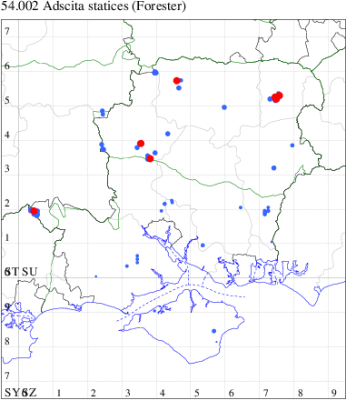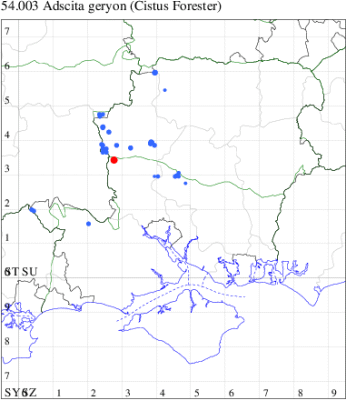2023 Annual Report for: Zygaenidae / Procridinae
For species seen in 2023 that had less than or equal to 100 records, full details are included; for more common species, the earliest, latest and highest count by vice-county are shown. The narrative for each species is taken from the main Hantsmoths website, and it is possible that some information on abundance and occurrence can get out of date, as it is impossible to keep up with all changes; however it should give a good introduction to each species. The tables in each species account summarise the previous status, and that for the current year.
For the maps, all records prior to 2023 are shown by a blue dot (the larger the dot, the more recent), with the current year's records shown in red. As previous records are superimposed on any report for 2023, new sites have greater emphasis (i.e. will show as 'more red').
In the species accounts, an asterisk next to a location indicates a new 10km square record; earliest ever dates are highlighted in orange, and latest ever in red. Initials in the species accounts refer to the recorders listed here. Please get in touch if you identify any omissions or errors, in particular if you have records that have yet to be submitted. Details of how to submit records can be found here.
54.002 [B&F: 0163] Forester Adscita statices (Linnaeus, 1758) - Local
Local in limestone grassland, chalk downland, heathland, sand-dunes and woodland margins throughout much of England, a priority species under the UK Biodiversity Action Plan. In Hampshire and on the Isle of Wight has disappeared from many localities since the 1950s, mainly as a result of habitat loss, and now known from only one locality in north Hampshire (Odiham Common), and one in south Hampshire (Martin Down), with occasional, scattered records elsewhere. Wingspan male 25-31 mm, female 22-25 mm. Larva feeds on Common Sorrel.
Records prior to 2023
| Vice County | #Records | #Individuals | First Record | Last Record |
|---|---|---|---|---|
| 10 | 3 | 0 | 1875 | 1992 |
| 11 | 38 | 29 | 1800 | 1984 |
| 12 | 140 | 2676 | 1800 | 2022 |
2023 records
| Vice County | #Records | #Individuals | Max Quantity |
|---|---|---|---|
| 12 | 8 | 37 | 12 |

Records by year
Records by week (adult)
Records by week (larval)
Record Details
VC12: Hazel Down, Leckford, one, field observation, 21 Jun (JCoz); Stockbridge Down, present, field observation, 09 Jul (iNat); Beacon Hill, Burghclere, one, field observation, 07 Jul (KGer); Odiham Common, 12, field observation, 26 May (AMD); 10, field observation, 29 May (MJW); 10, field observation, 27 May (BGD); present, field observation, 28 May (AMit); three, field observation, 01 Jun (KBW)
54.003 [B&F: 0164] Cistus Forester Adscita geryon (Hübner, [1813]) - Nationally Scarce
Nationally scarce (Nb) on calcareous grassland, favouring south-facing hillsides, formerly widespread across much of southern England and Wales, now gone from many localities where it was once plentiful. In Hampshire restricted to the western end of the chalk, but reported with regularity only from West Down, Chilbolton. Not recorded from the Isle of Wight to date. Wingspan male 19-25 mm, female 18-22 mm. Day-flying. Very similar to Forester A. statices and Scarce Forester Jordanita globulariae, from which distinguished by minute differences in the antennae but dissection may be required for accurate determination of individuals found on new sites. Larva feeds on Common Rock-rose.
Records prior to 2023
| Vice County | #Records | #Individuals | First Record | Last Record |
|---|---|---|---|---|
| 11 | 15 | -2 | 1800 | 2006 |
| 12 | 98 | 284 | 1951 | 2022 |
2023 records
| Vice County | #Records | #Individuals | Max Quantity |
|---|---|---|---|
| 11 | 1 | 5 | 5 |

Records by year
Records by week (adult)
Records by week (larval)
Record Details
VC11: Broughton Down HIWWT NR*, five, field observation, around Rock Rose, 14 Jun (ACr)
